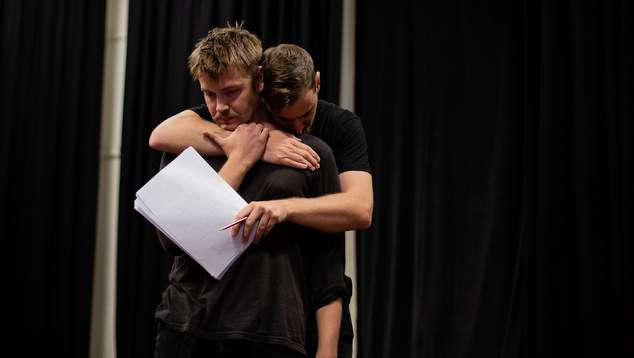
“On a quiet night in the sleepy town of St Augustine, Haley Woodward goes missing while hiking through Box Elder Canyon. As Dale searches for the missing girl, his boyfriend Austin is becoming dangerously obsessed with a beehive, believing it grants him insight into the true nature of the universe.”
So reads the synopsis for the latest play from theatre group Rorschach Beast. Their 2017 production Bus Boy won the Martin Sims award at Fringe World, and in May they’ll unveil their latest work Hive Mind at The Blue Room.
OUTinPerth chatted to writer and director Geordie Crawley about Hive Mind.
The description for this show is that it’s about how online communities are affecting our real life communities. What prompted you to explore this as a theme for a dramatic work?
The theme came after the story. My main goal in creating this work is about telling a good story, and then finding ways to enhance the relevancy of that story to a contemporary audience.
For me, part of writing for theatre is making sure the story I craft is engaging and beautiful. After I have these narrative structures in place, then I start looking at what themes are making themselves most apparent. Once I’ve focused in on what the show is about thematically I can start reshaping the story so that any piece of the puzzle that doesn’t speak to the theme is discarded in favour of something more relevant.
The theme that kept appearing throughout Hive Mind was community. So I just took it and ran with it. I also think it’s an important theme. Australians care about their communities, I know I do. I am surrounded by a face-to-face community of talented theatre-makers, all of whom inspire me to work harder and make thoughtful work. I value these face-to-face relationships, but I’m also aware that communities are increasingly moving online through services like Facebook, Twitter, Tumblr or 4Chan.
What happens to those people who don’t have access to online communities? Maybe they’re too old and couldn’t adjust to this new normal, or they’re suspicious of this new corporate digital surveillance culture. I’m fascinated by what happens when people like this are left behind.
Do you think we’ll eventually get board with online communities and start connecting more in person?
I don’t think anything will ever replace face-to-face communication and communities. They’re special and important. But I also know that the internet is just a little baby right now. We are only now discovering the true capabilities of the internet, for good and ill.
I think to try and predict where the internet will be in ten, twenty, fifty years is a fools errand. The advancements in technology are just too fast, and the consequences too big for us to understand. But I think online communities are here to stay, and I think we’ll only begin really understanding the human side effects of this shift in another ten years.
This doesn’t even begin to touch on the effect the internet will have on our financial markets, our relationships and our theatre-making.
How did the script and story develop as you worked on it?
To a certain extent, this show is just a compilation album of things I think are cool and beautiful. I wrote a first draft of this script in 2014, and then came back and made a list of things I thought were interesting dramatically, and then just tried find ways to incorporate them.
What would I have to do to make this script something I would find dramatically interesting? One of the first changes I made was to switch the central couple from being straight to gay, and then from there it was just about finding ways to up the stakes, twist the bone, or just keep myself entertained.
Your previous show Bus Boy garnered a lot of critical acclaim, will people who loved that show find similarities with this work?
I directed Bus Boy, and I do love that show deeply, but crucially it was written by the amazing and talented Izzy McDonald. We were very lucky in that we won the Martin Sims Award and the Theatre Award for that show at Fringe World 2017.
I think there are definitely similarities between Bus Boy and Hive Mind. Both of them have a focus on narrative and heart. Izzy’s writing is all about marinating in the emotions of the characters at any given time. I am more interested, in Hive Mind at least, in narrative drive. How can we forward the narrative engine chugging along. But I had a hand in shaping both, so I think that audiences who enjoyed Bus Boyshould book tickets to Hive Mind.
Could you give up the online world and live without it?
I think we all have dreams of giving up this online world, going off grid. It’s a little dream in the back of my mind to be able to live self sufficiently on some beautiful plot of land out in the country.
I’ve successfully deleted Facebook for months at a time but… something keeps pulling me back in. It’s addictive. Maybe I need to just go cold turkey on Facebook. But then who knows? Maybe I’ll get addicted to going cold turkey on things.
Hive Mind is on at The Blue Room from 1-19 May. Tickets are available now.
Graeme Watson, images Marshall Stay





